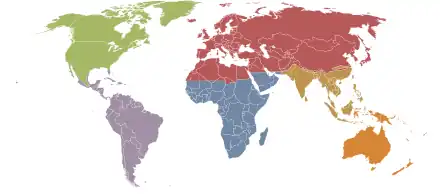Miklos Dezso Ferenc Udvardy | |
|---|---|
| Born | 23 March 1919 |
| Died | 27 January 1998 (aged 78) Sacramento, California, United States |
| Scientific career | |
| Fields | Biology, biogeography, and ornithology |
Miklos Dezso Ferenc Udvardy (March 23, 1919–January 27, 1998) was a Hungarian-born Canadian biologist and professor at the University of British Columbia. He made significant contributions to various fields, including biogeography, evolutionary biology, ornithology, and vegetation classification. Udvardy published 191 papers and books including an influential text on zoogeography.
Early life and career
Udvardy was born on March 23, 1919, in Debrecen, Hungary. His father, Miklos Udvardy de Udvardy et Básth, held a noble title, and his mother was Elizabeth Komlossy de Komlos. Although Udvardy initially developed an interest in birds, his father encouraged him to pursue a legal education. However, he eventually obtained a doctorate in biology from the University of Debrecen in 1942. He began his career as a research biologist at the Tihanyi Biological Station, located on Lake Balaton in western Hungary.[1]
In 1948, Udvardy left Hungary on a postdoctoral fellowship at Helsinki University in Finland under Pontus Palmgren. It was during this time that he met his future wife, Maud Björklund. Subsequently, Udvardy relocated to Uppsala, Sweden. He briefly served as the curator of marine invertebrates at the Swedish Museum of Natural History in Stockholm.
Later career
In 1952, Udvardy joined the University of British Columbia in Vancouver, British Columbia, where he served as assistant professor in the department of zoology. From 1953 to 1966, he taught courses on comparative anatomy and ornithology. During the academic year 1958–1959, he served as a visiting professor at the University of Hawaii, and in the academic year 1963–1964, he was the Lida Scott Brown Lecturer in Ornithology at the University of California, Los Angeles.
Between 1967 and 1991, Udvardy served as a professor of biological sciences at California State University, Sacramento (CSUS). During his time there, he supervised the work of eight graduate students and spent a year as a visiting professor at the University of Bonn in Germany. He also served as a Fulbright lecturer at the National Autonomous University of Honduras for one year. At CSUS, he taught various subjects such as biogeography, evolution, ornithology, and speciation. A graduate student award was established at CSUS bearing his name.

Although Udvardy developed the concept of competitive exclusion, he did not use the term that later became associated with the idea. He was among the first to emphasize the role of human activities in species dispersal and the introduction of species to new environments, highlighting the potential consequences of such actions. Udvardy coined the term "zoogeography" to describe the study of animal distribution and authored the book "Dynamic Zoogeography" on the subject.
Miklos Udvardy died from surgical complications in Sacramento, California, on January 27, 1998. He was survived by his wife Maud, their three children, and two grandchildren.
Selected publications
References
- ↑ Csuti, Blair; Brittan, Martin R. (1999). "In Memoriam: Mikos D. F. Udvardy, 1919-1998" (PDF). The Auk. 116 (1). doi:10.2307/4089468. JSTOR 4089468.
External links
- Dynamic Zoogeography (1969)